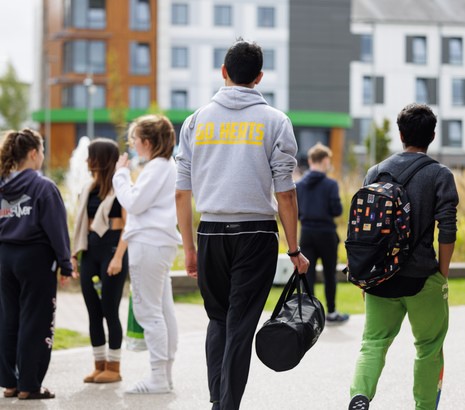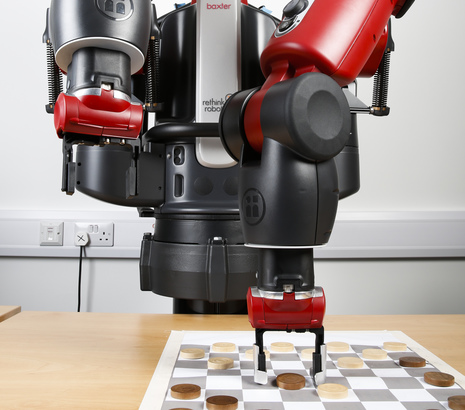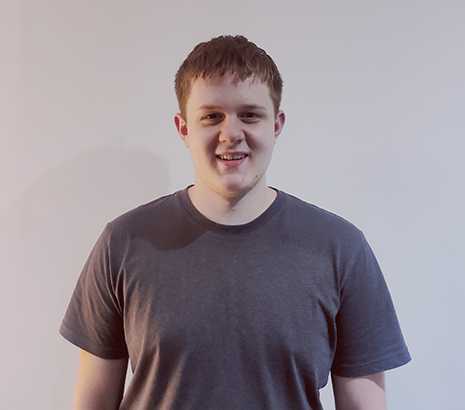Sign up for updates
Interested in studying at the University of Hertfordshire and want to sign up to our mailing list to learn more about our facilities, living in the UK and student life? Use the form below and our team will also keep you informed of key updates such as events near you, applications opening and more!
BSc (Hons) Computer Science (Online)
Key information
-
Typical offer:
Entry requirements -
Fees: See below
Full details -
Institute code: H36
Why choose this course?
- You can study when and where you want, fitting in with your other commitments such as work or family.
- Our online degrees are based on their on campus equivalents with the same academic quality standards and processes so your award will be recognized worldwide.
- Study at a highly-regarded, well established computer science department with excellent facilities, strong links to both business and research, and a track record of graduate success.
- BSc (Hons) Information Technology is also available to study online.
- Computer Science saw 90% of its research ranked as world-leading. (Research Excellence Framework, 2021).
For more information about how online study works, funding and how to apply, please visit UH Online.
Computer Science at the University of Hertfordshire
See how The School of Computer Science at the University of Hertfordshire leads the industry with its world class research and strong links with businesses.
What's the course about?
Our online computer science and information technology courses are very similar to our campus-based degrees, and the academic standards required are just as high. However, they give you the flexibility to study from wherever you like and to fit learning around other commitments. Computer science gives you a broad range of skills and knowledge in core areas including foundations of computation, programming, multimedia, networks, databases, operating systems and software engineering. Information technology includes many aspects of computer science but with more focus on the computer technology needs of people and organisations.
For more information about how to apply, funding and how online study works, please visit the UH Online.
What will I study?
With online study, you study at your own choice of time and place, saving on travel and accommodation costs and fitting in with your other commitments.
Our programmes begin on specific dates, you study as a small group, there are deadlines for coursework assignments and online tests with a fixed 24-hour period to take them in. This way you combine the flexibility of distance learning with the self-discipline and community spirit of conventional tuition. Our students come from all over the world so you will have a great opportunity to gain first-hand experience of global networking.
With online study, you use the Internet for learning: to access course information, to communicate with others, and to transmit completed assignments for marking. We take advantage of online technologies to provide faster and more effective communication and to deliver much richer learning materials than is normally possible with other forms of distance learning.
This means that wherever you are in the world, providing you have access to a suitable PC and Internet connection, you can study for a University of Hertfordshire award without attending the University in person.
Course Length
For entry at Level 4 the programme in its entirety is offered in two study patterns:
- an entirely part-time study pattern (6 years in duration) or
- a study pattern which offers part-time study for levels 4 and 5 or full-time study for level 5 and 6 (4 or 5 years in duration).
For entry at Level 6 the programme in its entirety is offered in two study patterns:
- an entirely part-time study pattern (2 years in duration) or
- an entirely full-time study pattern (1 year in duration)

Student Blogs
Dilek Selin - A Typical Day
A typical day
A typical day would start off with getting up, catching the University UNO bus and heading towards the forum canteen (they stop serving breakfast around 11:00 but this often changes) to grab a full English breakfast and a coffee at Starbucks (yes, we have a Starbucks on campus!!). During this time, I would regularly check my emails or look at my timetable for the day ahead to find the rooms and prepare my notes for the relevant lectures and tutorials. Generally, after finishing my breakfast I would either grab a meal deal for lunch at the Student union shop since it gets busy towards lunchtime or even because I wouldn’t have time to grab food if I had back to back classes, so having prepped lunch with me or just snacks if I wasn’t feeling too hungry – bringing along food with me was always a must.
Later, if I ever had breaks during my day, I would go to the Learning Resource Centre (LRC) aka the university library. If I didn’t have any upcoming assessments, I would check the active students timetable to see if there were any sports events going on and take part in those sessions where I could participate in sports for free with other students at the uni. After that, I would go to my next classes and then finally when It was home time, I would go back to the bus stop and head home. Since I was a commuting student, by the time I got back home I had enough time to prepare myself for the next day or just wind down from the events of the day. Every student would get at least one day off in the week. For me, in my first year, this was Wednesdays. Including the weekends, I had plenty of time to run errands, book appointments for health checks and even catch up on studies thanks to the extra day off. For the students who lived on campus, they would often take their day’s off as an opportunity to set it as a laundry day!

Student Blogs
Dilek Selin - Things you should know
Things you need to know before studying Computer Science at Herts
It’s okay to not know what you want to do, you don't have to have everything figured out now and as long as you have a direction or a path, stick to it and take new opportunities that present themselves to you, you won't regret taking up on new things and going out of your comfort zone. For me, the best thing I did was take part in a hackathon. The fintech company that was hosting it later offered me my placement, it’s one of those things that you don't expect to happen to you but you sometimes have to make your own luck in these things and research and throw yourself out into the deep end because the challenges we face now are only going to make us stronger for the challenges we are to face ahead.
In my first year everyone was fed in through the same stream, we studied four modules (modules are like subjects), so we took, programming- you get to learn about coding and different programming languages. I learnt about Java but I believe they have introduced Python as well, the second module was Platforms for computing -essentially this module covered the hardware side of computing and we learnt about logic gates which tie in with the content that the electronic engineering students also study, so even though there's a slight overlap it gives us more depth in our subject area and also a chance to explore computing aspects. The third module you'll study at level four (level four being the first year) is models and methods of computing, this was the maths-based module and you'll be exposed to theorems and truth tables and binary, it really will shape your understanding in computing logic. And finally, Human dimensions of computing, in this module you'll get the chance to work in a group and put your presentation skills to practice, learning about the ethical side of computer science. All four of these modules are further explored in your second-year studies, where the knowledge you gained will be expanded in the sense where one of each of those four modules will link to your second-year modules. Later in your final year, you get to choose a specialised area such as Software Engineering, AI, Networks and Cyber Security. You might be thinking how I know which one to pick, luckily throughout your academic journey, you'll be given tasters to each of the streams. For example, in my second year I took up AI and robotics modules which I really enjoyed- up until then I was convinced, I'd stick with the software engineering stream, but If I had never tried, I would have never known!

Student Blogs
Jack - A day in the life as a computer science student
Hello 👋
As a commuting Computer Science student, I normally leave around an hour before my day’s lectures and practicals start and arrive at the Park and Ride car park before taking the bus to the College Lane campus 🚌
For my second-year timetable, practicals are allocated to Monday and Tuesday, whereas lectures are allocated to Thursday and Friday, with Wednesday being a study day for reading up on the lecture material. During my lectures, I will normally take notes on my laptop so I can read over them later on and in my practicals, I will either use my laptop or the desktops in the computer labs depending on what software we need for the practical.
After finishing the lecture/practical, I normally have lunch in the Forum Restaurant with my friends and discuss the day’s work. Finally, once I finish for the day, I return to the Park and Ride and go home where I can review my notes and reinforce what I learned during the day.
Facilities
In the computer labs, the desktops have a range of useful software already installed including IDEs (Integrated Development Environments) such as BlueJ (for Java development), IDLE (for Python development) and other tools such as Logisim (for creating circuits using logic gates and visually how they work) and SQL Developer (for interacting with databases and executing SQL commands). Using these computers, I can complete all the practical work which is set by the lecturers so I can apply the theory from the lectures.
Projects
Currently, in my spare time, I am working on a dungeon crawler game made in Python using the Arcade library (which can be found at https://github.com/Aspect1103/Hades). This has needed various features to get it to work including map generation, player control, enemy AI, collectables and so on.
Recently, I just finished implementing some C++ extensions using the Python C-API to speed up the map generation granting me a five times speed increase and the breadth-first search vector field (which is used for navigating the enemies towards the player) granting me a seventeen times speed increase. My next steps are to further optimise the map generation and vector field and to rewrite the enemy AI making it faster and more intelligent. Creating this project has greatly improved both my project management and problem-solving skills which I can use in my modules this year to complete the tutorial exercises, coursework, and exams.


